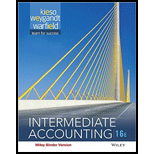
Fair value: Fair value is a selling price which is agreed by the buyer and seller. A probable estimate of the market price of good, service or asset based on the market situation is termed as fair value.
(a) To prepare: To prepare the
Given information: All the information related to M Company is provided in the question document.
(b) To prepare: To prepare the journal entries on December 31, 2017, and December 31, 2019, for M Company related to these bonds, assuming it uses the fair value option.
Given information: All the information related to M Company is provided in the question document.
Want to see the full answer?
Check out a sample textbook solution
Chapter 17 Solutions
Bundle: Intermediate Accounting 16e Binder Ready Version + WileyPLUS Access Code
- Accurate Answerarrow_forwardCarter Corporation has fixed costs of $1,800,000, and variable costs are 45% of sales. What are the required sales if Carter Corporation desires a net income of $200,000? Answerarrow_forwardMangesh Analytics, Inc. sells earnings forecasts for European securities. Its credit terms are 2/15, net 40. Based on experience, 60 percent of all customers will take the discount. What is the average collection period?arrow_forward
- Need help with this question solution general accountingarrow_forwardCan you please answer the accounting question?arrow_forwardCarter Corporation has fixed costs of $1,800,000, and variable costs are 45% of sales. What are the required sales if Carter Corporation desires a net income of $200,000?arrow_forward
- Monu Enterprises received $9,000 cash from the sale of a machine that had a $13,000 book value. If the company is subject to a 25% income tax rate, the net cash flow to use in a discounted-cash-flow analysis would be:arrow_forwardWhy does stakeholder impact analysis matter? [Financial Accounting] A. Impact remains constant B. Users need identical information C. Different user needs affect reporting choices D. Shareholders alone matterarrow_forwardI need help Briefly describing 2 analytical techniques based on the time value of money concepts. And Briefly describing 2 analytical techniques which are not based on the time value of money concepts. Along with Describing what you consider to be the top 2 advantages and 2 disadvantages of each technique and provide an example to support your top advantage of each method.arrow_forward

 AccountingAccountingISBN:9781337272094Author:WARREN, Carl S., Reeve, James M., Duchac, Jonathan E.Publisher:Cengage Learning,
AccountingAccountingISBN:9781337272094Author:WARREN, Carl S., Reeve, James M., Duchac, Jonathan E.Publisher:Cengage Learning, Accounting Information SystemsAccountingISBN:9781337619202Author:Hall, James A.Publisher:Cengage Learning,
Accounting Information SystemsAccountingISBN:9781337619202Author:Hall, James A.Publisher:Cengage Learning, Horngren's Cost Accounting: A Managerial Emphasis...AccountingISBN:9780134475585Author:Srikant M. Datar, Madhav V. RajanPublisher:PEARSON
Horngren's Cost Accounting: A Managerial Emphasis...AccountingISBN:9780134475585Author:Srikant M. Datar, Madhav V. RajanPublisher:PEARSON Intermediate AccountingAccountingISBN:9781259722660Author:J. David Spiceland, Mark W. Nelson, Wayne M ThomasPublisher:McGraw-Hill Education
Intermediate AccountingAccountingISBN:9781259722660Author:J. David Spiceland, Mark W. Nelson, Wayne M ThomasPublisher:McGraw-Hill Education Financial and Managerial AccountingAccountingISBN:9781259726705Author:John J Wild, Ken W. Shaw, Barbara Chiappetta Fundamental Accounting PrinciplesPublisher:McGraw-Hill Education
Financial and Managerial AccountingAccountingISBN:9781259726705Author:John J Wild, Ken W. Shaw, Barbara Chiappetta Fundamental Accounting PrinciplesPublisher:McGraw-Hill Education





